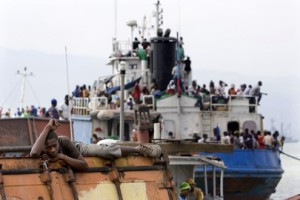
ERI recently joined more that 30 other NGOs in signing an Open letter to the European Commission,the European Parliament and EU Member States urging the inclusion of migrants and migration-related targets in the post-2015 Sustainable Development Goals agenda.
Although 232 million migrants contribute to the economic and social well-being of their countries of origin/heritage and destination worldwide – some 72 million in Europe, they are not yet fully recognized as actors and subjects of sustainable human development.
The letter expresses concern that a protectionist agenda, driven by narrow economic and national interests, would prevail over an EU-oriented human-rights based approach to migration policy that would benefit countries of origin, transit and destination (i.e., in Europe) as well as migrants themselves.
The letter urges the adoption of the ‘Stockholm Agenda’ a set of migrant-centered, rights-based goals and targets that support development that is human, economic and sustainable, which was the product of the recent Global Forum on Migration and Development and parallel civil society processes in Stockholm which has been endorsed by 270 civil society organisations around the world.
The targets call for:-
1. Decent working conditions and social protection for all migrants, regardless of migration
status, that conform to international labour standards;
2. Reduction in the cost of sending remittances and reduction in the cost of labour migration
and recruitment;
3. Access to social and legal protection, and decent work for migrant women and girls, including
domestic workers;
4. Access to education for all migrants and migrants’ children, regardless of migration status;
5. Access to adequate and quality healthcare for all migrants, regardless of migration status;
6. Increased migrant participation and contribution in public policy planning and
implementation;
7. Institutionalized mechanisms that embrace, integrate or reintegrate migrants and their
families into their countries of origin, heritage and destination;
8. Full engagement of migrants and diaspora members as partners in development;
9. Facilitating safe, orderly and regular migration, through enhanced international cooperation